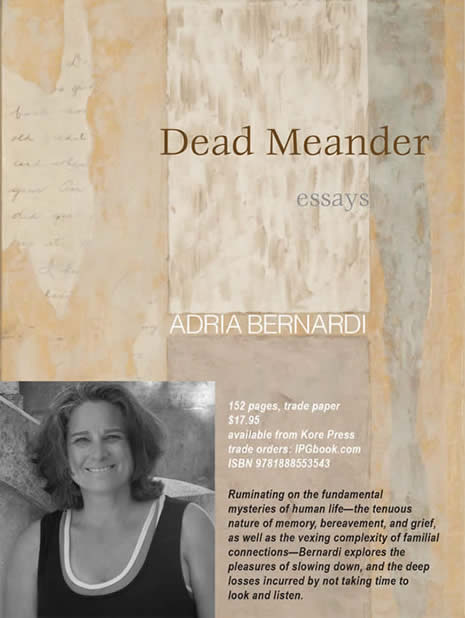2014 IPPY Bronze Medal Award Winner in creative non-fiction!

$18.95, 6x 8", 152 pgs, perfect bound
ISBN: 978-1-888553-54-3
place individual orders through Kore Press
purchase for the trade at IPGbook.com
Adria Bernardi author page |

Born out of fragments of breakages made by leavings off, such as occurs in immigration and other traumatic experiences, the IPPY Award-winning essays of Dead Meander investigate how things can be made whole, or more whole, in the time following such leavings, transitions and traumas.
Adria Bernardi is the author of two novels, Openwork and The Day Laid on the Altar, which was awarded the 1999 Bakeless Prize by Andrea Barrett, and a collection of short stories, In the Gathering Woods, which was awarded the 2000 Drue Heinz Literature Prize by the late Frank Conroy. Her translation of the work of the Italian poet Raffaello Baldini, Small Talk, was published in 2009. She was awarded the 2007 Raiziss/de Palchi Fellowship by the American Academy of Poets to complete this work. Her translation of the poetry and prose of Rinaldo Caddeo was published as Sirens’ Song. She has also translated Adventures in Africa by Gianni Celati and Abandoned Places by Tonino Guerra. She is the author of an oral history, Houses with Names: The Italian Immigrants of Highwood, Illinois. Bernardi has taught fiction writing at the Warren Wilson MFA Program for Writers and at Clark University in Worcester, Mass. |
|
“If I know that in pentameter the division between the two halves is marked by a break between words, that there must not be a hiatus, elision, or syllaba anaceps (short allowed to stand for long) at this position, I can write an elegiac couplet. If I can write an elegiac couplet, I will have written an elegy. If I have written an elegy, I will have found consolation in the contemplation of some permanent principle and let the body go.”
from Dead Meander |
"The hypnotic, original structure of Adria Bernardi’s poetic prose, as it sends out associative tributaries (“meanders”), finding language for extreme states, explores and extends the forms and rituals of elegy. Hers is an astonishing, at times excruciating awareness, capable of brilliantly evoking what consciousness endures when the body—whether one’s own, a child’s, or the body politic—is under assault."—- Eleanor Wilner
In Dead Meander Bernardi adroitly follows the pathways of memory to arrive in a place both traveled and not traveled before. In the essay “Path Crossed” she introduces us, through dark turbulent convolutions of language to her battle with migraine where words morph into twisted versions of themselves. She tells her story with laugh-spiced plays on language, learning, and stream of consciousness. The only thing the brain seems capable of in this migrainous state is to free associate. A brain run amok. Amoqu, from the Malay, in a murderously frenzied state, an undisciplined or faulty manner. Each essay is a fragment of memory that twines forward and back in time, place, birth and death, all the while incorporating scientific and scholarly facts and poetry. Each of the ten essays in this book leaves the reader wanting more tickets to ride Bernardi’s mind.----Eve Rifkah
In awarding this essay third place in the 1993 Roberts Writing Awards, Rachel Hadas described “Alba: Fragments for An Elegy: “A rare example of discontinuous style working – even the white spaces on the page are eloquent. An eloquent and compressed mini-memoir.”
|
|

